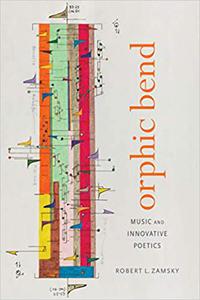
Robert L. Zamsky, "Orphic Bend: Music and Innovative Poetics "
English | ISBN: 081736014X | 2021 | 224 pages | PDF | 4 MB
Restages fundamental debates about the relationship between poetry and music
Orphic Bend: Music and Innovative Poetics explores the impact of music on recent pioneering literary practices in the United States. Adopting the myth of Orpheus as its framework, Robert L. Zamsky argues that works by Charles Bernstein, Robert Creeley, John Taggart, Tracie Morris, and Nathaniel Mackey restage ancient debates over the relationship between poetry and music even as they develop work that often sharply diverges from traditional literary forms. Opening each chapter with a consideration of the orphic roots of lyric, Zamsky integrates contemporary debates over the prospects and limitations of humanism, the meaningfulness of gesture and performance, and the nature of knowledge with the poetics of the writers under consideration, grounding his analysis in close readings of their work.
The myth of Orpheus is used as a lens throughout the book, its different facets illuminating sometimes dramatically different aspects of the shared framework of poetry and music. In the case of Bernstein, for instance, Zamsky highlights Ezra Pound's meditations on the relationship between poetry and music (the ground upon which Pound seeks to recapture the lost possibilities of the Renaissance) and Bernstein's incisive critique of Pound. For her part, Morris emphasizes the performative power of spoken language, foregrounding the fact that all spoken language bears cultural, communal, and personal marks of the speaker, improving an ensemble self even within the most elemental features of language. Meanwhile, in Mackey's work, the orphic voice of the poet powerfully reaches toward an order of knowledge in which poetry and music are nearly indecipherable from one another. In this sense, music and the musicality of poetic language are the gateways for Mackey's Gnosticism, the mechanisms of initiation into a realm, not of secrets to be learned, but of visionary knowing that continuously unfolds.
The text explores a range of musical influences on the writers under consideration, from opera to different iterations of jazz, and underscores the variety of ways in which music informs their work. Many of these writers effectively present a theory of music in their invocations of it as an inspiration for, or as an analog to, poetic practice. Zamsky's focus on poetry and music echoes important interdisciplinary studies on literary modernism, a period for which the importance of music to literary practice is well established and extends that discussion to the contemporary context. In doing so,
Read more
Download From UploadCloud
https://www.uploadcloud.pro/sz7ff8vf9yct/qoaq9.O.B.M.a.I.P.rar.html
Download From NovaFile
https://nfile.cc/9j740abQ/qoaq9.O.B.M.a.I.P.rar

https://rapidgator.net/file/f6cfb6215ae90187698740756eeee29e/qoaq9.O.B.M.a.I.P.rar.html

https://nitroflare.com/view/2C35AF284542382/qoaq9.O.B.M.a.I.P.rar

https://uploadgig.com/file/download/Dc0c1087694fa37c/qoaq9.O.B.M.a.I.P.rar
https://www.uploadcloud.pro/sz7ff8vf9yct/qoaq9.O.B.M.a.I.P.rar.html
Download From NovaFile
https://nfile.cc/9j740abQ/qoaq9.O.B.M.a.I.P.rar

https://rapidgator.net/file/f6cfb6215ae90187698740756eeee29e/qoaq9.O.B.M.a.I.P.rar.html

https://nitroflare.com/view/2C35AF284542382/qoaq9.O.B.M.a.I.P.rar

https://uploadgig.com/file/download/Dc0c1087694fa37c/qoaq9.O.B.M.a.I.P.rar
Links are Interchangeable - No Password - Single Extraction
